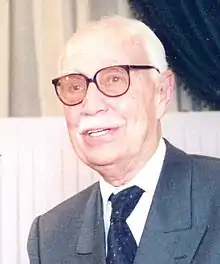Abdelkrim Ghallab
Abdelkrim Ghallab (December 31, 1919, in Fes – August 14, 2017, in El Jadida) was a Moroccan political journalist, cultural commentator, and novelist. He is an important figure both in the literary and political field (editor of the Istiqlal Party daily al-Alam).

| Moroccan literature |
|---|
| Moroccan writers |
|
| Forms |
|
| Criticism and awards |
|
| See also |
Early life
He studied both at the University of Al-Karaouine in Fez and at the University of Cairo, where he took his M.A. in Arabic literature. He is the author of five novels and three collections of short stories. Among his best known novels are Sab'ab Atwat ("Seven Gates", 1965) and Dafann al-m'd ("We buried the past", 1966); the latter is praised as representative of a new school of writing called "nationalist realism".[1] According to Simon Gikandi his Arabic style is known for its "graceful and at times scholarly classicism".[2]
Career
In 2000, the Union of Arab writers in Egypt included his novel Al-Mu`alîm `Ali (Master Alí) among the hundred best Arabic novels in history. In 2001, the Moroccan department of Culture published the complete works of Ghallab in five volumes. In 2004 he was awarded the Maghreb Culture prize of Tunis. His work has been translated in many languages.[3]
Abdelkrim Ghallab died in El Jadida on August 14, 2017, aged 97.[4]
Bibliography
- al-A'mâl al-kâmila (5 Volumes). Manshűrât Wizârat al-Thaqâfa wa-l-Ittis:âl, 2001.
The first volume includes: Mât qarîr al-'ayn (I will die comforted, 1965); al-Sudd ; al-Ard: h:abibatî (my beloved earth, 1971); Waajradja-hâ min al-djanna (la sacó of paradise, 1971); Hâdhâ al-wadjh a'rifu-hâ (Conozco ese rostro, 1971).
The second volume is about the auto-biographical novel and includes: Sab'a abwâb (seven doors, 1984); Sifr al-takwîn (Génesis, 1996) and al-Shayjűja al-z:âlima (La injusta vejez, 1999).
The third volume, (novels) includes: Dafannâ al-mâd:î (The past is buried, 1966) and al-Mu' allim ' Alî (Ali the teacher).
The fourth volume includes: S:abâh:.. wa-yazh:af al-layl (For tomorrow...and the face of the night, 1984).
The fifth volume includes: Wa-'âda al-zawraq ilá al-nab (la barca volvió à la fuente, 1989) and Shurűh: fî l-marâyâ (Comentarios en el espejo, 1994).
- Nabadat Fikr
- Fi Athaqafa wa Al Adab
- Fi Al Fikr A-ssiassi
Novels
- Dafana Al Madi
- Lem'allem Ali
- Akhrajaha mina Al Janna
- Charqia fi baris (An oriental woman in Paris)
Translations in French
- Le Passé enterré, (trad. Francis Gouin), Publisud, coll. « Confluents », Paris, 1990, ISBN 2-86600-324-1
References
- Simour, Lhoussain (2016). Larbi Batma, Nass el-Ghiwane and Postcolonial Music in Morocco. McFarland. pp. 29, 31. ISBN 9781476625812.
- Simon Gikandi, Encyclopedia of African literature, p. 283
- Salim Jay, Dictionnaire des écrivains marocains, Casablanca: Eddif, 2005, p. 191
- "Le journaliste et écrivain marocain Abdelkrim Ghallab est décédé" Archived 2017-11-09 at the Wayback Machine In: huffpostmaghreb.com, Retrieved 14 August 2017]
- Seth Graebner, entry on Abdelkrim Ghallab, Encyclopedia of African Literature (ed. Simon Gikandi), 283.
- Salim Jay, Dictionnaire des écrivains marocains. Casablanca: Eddif, 2005, 191-192
- Wazzani, H:asan al- (ed). Dalîl al-Kuttâb al-Magâriba A`d:â` Ittih:âd Kuttâb al-Magrib. Rabat: Manshűrât Ittih:âd Kuttâb al-Magrib, 1993, 315-316.
- Pilar Lirola Delgado "Abd al-Karim Gallab: una personalidad de la vida política y cultural marroquí" In: Al-Andalus Magreb: Estudios árabes e islámicos ISSN 1133-8571, Nº 7, 1999, pags. 135-168
- Altona, Salih Jawad. “Ghallab as a committed writer and novelist”. Mundus Arabicus / Al-'Alam al-'Arabi, 1982, 2 35-52.
- Ian Campbell, U of Mary Washington, Imprisonment, Servitude and Moroccan National Identity in Two Novels by Abdelkarim Ghallab (lecture)
External links
- Ghallab, Abdelkrim (in Spanish)
- Interview with Abdelkarim Ghallab, Remembering for Tomorrow (publication of the European Cultural Foundation and Escuela de Traductores de Toledo, Annette van Beugen and Gonzalo Fernández Parrilla) about his autobiographical books The Seven Doors (Sab'at abwab), The Book of Formation, An Unjust Old Age (al-Shaykhukha alzalima) and Cairo Reveals its Secrets (al-Qahira tabuhu an asrariha). p. 59 N